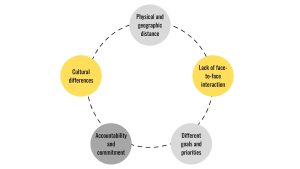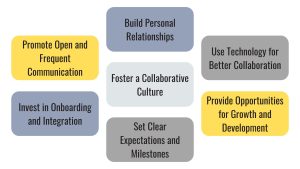Trust in Extended Teams: Build Strong Relationships
Introduction In today’s globalised and highly collaborative business environment, working with extended teams is becoming increasingly common. Organisations rely on external t...

Introduction
In today’s globalised and highly collaborative business environment, working with extended teams is becoming increasingly common. Organisations rely on external talent to bring expertise, flexibility, and innovation to their projects. However, integrating external team members into a cohesive unit presents a challenge, especially when it comes to building trust. Trust is the foundation of successful collaboration, and in the context of extended teams, it requires a deliberate effort to overcome boundaries related to culture, communication, and distance.
This article examines the importance of trust in extended teams and offers strategies for building strong relationships with external team members and external experts.
Why Trust Matters in Extended Teams
Trust is essential for any team to function effectively, but it becomes even more important when working with extended teams. External team members often work remotely or from different locations, which can lead to potential misunderstandings, misaligned expectations, and communication gaps. Without a strong foundation of trust, extended teams can experience delays, decreased productivity, and a lack of collaboration.
Trust in extended teams promotes open communication, encourages the sharing of ideas, and helps external team members feel more integrated with internal teams. It also ensures that both internal and external experts are aligned with the organisation’s goals and that they collaborate effectively, despite geographic or cultural differences.

Key Challenges to Building Trust in Extended Teams
Building trust with external talent can be challenging due to the following factors.

- Cultural differences. External team members may come from different cultural backgrounds, and different communication styles, work ethics, or expectations can create friction. Miscommunications or different assumptions about how work should be done can erode trust early in the relationship.
- Physical and geographic distance. In extended teams, especially remote teams, physical distance can hinder spontaneous communication and team bonding. Remote team members may feel disconnected from the core team, leading to a sense of isolation that erodes trust.
- Lack of face-to-face interaction. Face-to-face meetings, even virtual ones, build rapport faster than written communication alone. When working with external experts, the lack of face-to-face interaction can slow down the trust-building process.
- Different goals and priorities. External team members may have different priorities or expectations than internal employees. This discrepancy can lead to conflicts or a sense of mistrust if not managed properly.
- Concerns about accountability and commitment. Sometimes organisations worry that external talent may not be as committed to the project as in-house employees. Doubts about reliability and accountability can prevent a sense of trust from developing.
Strategies for Building Trust in Extended Teams
To build trust with external talent, organisations must actively foster a culture of collaboration, transparency, and mutual respect. Here are some strategies for building and maintaining trust in extended teams.

1. Promote Open and Frequent Communication
Clear and transparent communication is the cornerstone of building trust in extended teams. Ensure that all team members – internal and external – are informed about project goals, deadlines, expectations, and progress. Regular check-ins and providing multiple communication channels (video calls, instant messages, email, etc.) help reduce misunderstandings and keep everyone on the same page.
Encourage external team members to freely share their ideas and opinions. When people feel heard, they are more likely to believe that their contributions are valued. Ensure that communication is two-way, with ample opportunity for feedback.
2. Invest in Onboarding and Integration
Proper onboarding is critical for external team members to understand the company’s culture, values, and project goals. A comprehensive onboarding process helps external experts quickly adapt to your team’s working style and build early relationships. Include external team members in team-building events, virtual events, and knowledge-sharing sessions to build camaraderie.
When onboarding an extended team, it’s important to clearly define roles and responsibilities. This prevents miscommunication about accountability and ensures that all team members – internal and external – know their place in the big picture.
3. Build Personal Relationships
Trust is built through personal relationships, even in a professional context. Take the time to get to know external team members on a personal level. Encouraging informal conversations and celebrating personal events like birthdays or company anniversaries can create a sense of belonging.
Use virtual team-building exercises or in-person meetings whenever possible. Such interactions help bridge the gap between internal and external team members, making the extended team feel like one unit.
4. Foster a Collaborative Culture
For extended teams to be successful, a collaborative culture must be fostered. Avoid creating a gap between internal and external talent. Instead, encourage a mindset of shared goals and shared responsibility. Allow external team members to take ownership of their work and contribute to decision-making processes.
Recognise and reward the contributions of external experts in the same way as internal employees. This ensures that external talent feels just as important and valued, which builds trust.
5. Set Clear Expectations and Milestones
Establishing trust with external talent requires clarity from the start. Be upfront about project deadlines, deliverables, and quality standards. Setting clear goals and milestones ensures that external team members understand what’s expected of them and can hold themselves accountable without creating uncertainty.
When everyone is on the same page, there’s less room for doubt, and team members are more likely to trust each other to deliver on their commitments.
6. Use Technology for Better Collaboration
Technology plays a critical role in effectively managing extended teams. Use collaboration tools like project management software, shared documents, and instant messaging platforms to facilitate real-time collaboration. Tools like Slack, Asana, or Microsoft Teams can help maintain the flow of communication and provide a transparent view of each team member’s responsibilities and progress.
Having access to the same resources and real-time updates helps external team members stay engaged and provides accountability, which builds trust over time.
7. Provide Opportunities for Growth and Development
Investing in the professional growth of external talent shows that you value their long-term contribution to the team. Offering learning opportunities, such as training or access to new tools, demonstrates a commitment to their success, which builds loyalty and trust.
When external team members feel like they are growing with the project, they are more likely to remain committed and have confidence in the organisation’s leadership.
Long-Term Benefits of Trust in Extended Teams
Building trust in extended teams pays off in many ways, both in the short and long term. When external talent trusts the organisation they work with, they become more engaged, productive, and willing to do more. Trust leads to better collaboration, higher-quality work, and faster problem solving.
For organisations, building trust with external team members also improves retention of top external experts. This is especially important when working with specialised talent, as strong relationships reduce turnover and allow companies to retain expertise for future projects.
Conclusion
Trust is the glue that holds extended teams together. While it takes time and effort to build trust with external team members and outside experts across boundaries, the long-term benefits are worth the investment. By fostering open communication, integrating external talent into your team’s culture, and providing opportunities for collaboration and growth, you can build a strong and reliable extended team.
When trust is at the core of your extended team, both internal and external team members are more likely to work together harmoniously, helping your organisation achieve its goals with greater effectiveness and success.